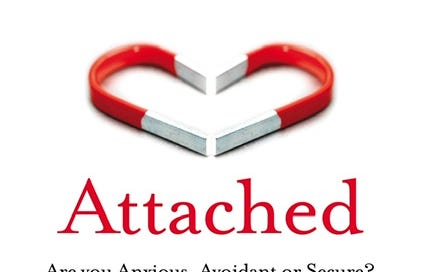Reading Attached—a short, 2011 self-help reading divergence—gives me romantic love clues. This honest book hinges upon a psychological idea formulated in the 1950s called attachment theory. It’s based upon a test of toddlers entering a playroom with other toddlers. Each child is accompanied by the mother.
The mother leaves after the child begins to play. The Fifties study identified three attachment styles from the experiment: the anxious child doesn’t fully recover from the mother’s departure. The avoidant child appears to be unaffected by the mother’s departure. The secure child reacts to the mother‘s departure as one might expect, then returns to play without much fuss. The authors explain their reasoning in applying attachment theory to adult romantic relationships. They’re persuasive, writing an absorbing argument backed by various scholars, studies and evidence.
The book was recommended by a credible source. Before I finished reading Attached, I mentioned it to several close friends. All except one expressed curiosity about which style suits them. Most wanted to know more. One of them confided that he’d already read the book and found it convincing. This friend enthusiastically endorsed Attached.
Frankly, Attached makes for some intense reading. Citing examples—almost without exception, heterosexual couples—Levine and Heller clarify that there’s no good or bad or right or wrong attachment style. Nevertheless, taking the tests put me on edge. I honestly answered for myself and about someone I love. In both cases, I was surprised by the answers and subsequent guidance. Overall, the results encourage me. I hadn’t expected that. Heller and Levine write with empathy and understanding. They write as if they know that romantic love can be agonizing—and that love is not enough—and that advice books often placate, mislead and confuse today’s romantic realist.
For example, they assert that, for persons with an anxious attachment style:
The key to finding a mate who can fulfill … needs is to first fully acknowledge your need for intimacy, availability, and security in a relationship—and to believe that they are legitimate. They aren’t good or bad, they are simply your needs.”
At several points, Attached’s authors promote being direct and wearing your heart on your sleeve—the opposite of most relationship advice—and defend dependency in strong, thoughtful and unequivocal language. The predominant thinking that being perceived as being needy is inherently toxic, they propose, ought to give way to clarity and candor in asserting one’s emotions, needs and wants.
Accordingly, they suggest striving to be rational about needing someone to love. Citing an instance of two adults who are dating, they write that:
Amir suggested spelling things out point-blank, as in ‘I love you very much; I need to know that you are there for me all the time. I want to know I can talk to you every day and not just when it’s convenient for you. I don’t want to have to cover up my wish to spend time with you for fear of driving you away.”
Facts, ideas and data, such as “a disproportionate number of avoidants [being] in the dating pool,” bullet points of potential “smoking guns” (warning signs) and a valuable communication technique compensate for any residual vagueness, overqualifying and overgeneralizing that can run amok in the self-help (especially romantic love) genre. The authors cite sources. They explain. They don’t make arbitrary assertions.
A climactic chapter details objectively communicating with a mate, partner, spouse or potential mate, including grappling with whether he or she is “the one” (and if that’s even worth asking). Levine and Heller conclude that “[i]t’s important to remember that even with effective communication, some problems won’t be solved immediately. What’s vital is your partner’s response—whether they are concerned about your well-being, has your best interests in mind, and is willing to work on things.”
An advantage of reading Attached is what amounts to reasonable guidance for securing a healthy romance during conflict:
Be available
Don’t interfere
Act encouragingly
Communicate effectively
Don’t play games
View yourself as responsible for your partner’s well-being
Wear your heart on your sleeve—be courageous and honest in your interactions
Maintain focus on the problem at hand
Don’t make generalizations during conflict
Douse the flame before it becomes a forest fire—attend to your partner’s upsets before they escalate
Of course, realizing true love is up to the individual(s). Rachel Heller and Amir Levine write with confidence, insight and respect for the reader’s intelligence. This is rare. Attached is neither shallow nor airy. It’s not loaded with platitudes or pop psychology. Attached is also not overly dry and abstract. Authors focus on practical, day-to-day solutions, granting the reader the benefit of the doubt that you deserve to be intimate with—and attached to—one with whom you are in love. I learned why attachment is different from commitment and why understanding the former can lead to the latter. This makes it easier to risk being vulnerable in finding and securing romantic love.
Related Articles
Book Review: Deep Work
Recently, I finished reading a book that’s changing my life. It’s one of those books purported to boost one’s productivity, which I learned about after attending a summer lecture (at an Objectivist conference). The speaker, a Massachusetts Institute of Technology (MIT) graduate named Cal Newport, delivered a scalding critique of Big Tech, social media, …
Books: Can You Really Love a Dog?
A new book bundles thoughts, ideas and advice by Leonard Peikoff and Ayn Rand on pets. Can You Really Love a Dog?, which I’ve had the pleasure to edit, is edited, published and presented by Capitalist Pig fund manager Jonathan Hoenig. Jonathan’s an Autonomia
Book Review: Fosse by Sam Wasson
Who was Bob Fosse? Author Sam Wasson delves into the details in an exhaustive biography. He comes up with a dark and fascinating portrait. Pointing to one of the 20th century’s most influential artist’s fast, sharp and sensuous movement as “part of [the] dance vocabulary” that expresses Fosse’s philosophy, the biographer unfurls an enveloping, intellect…







